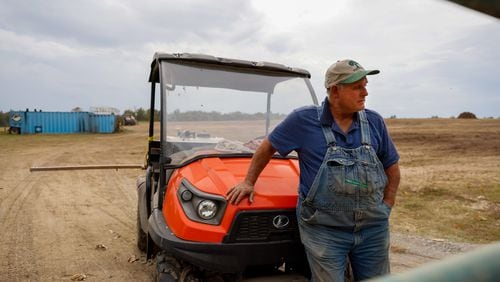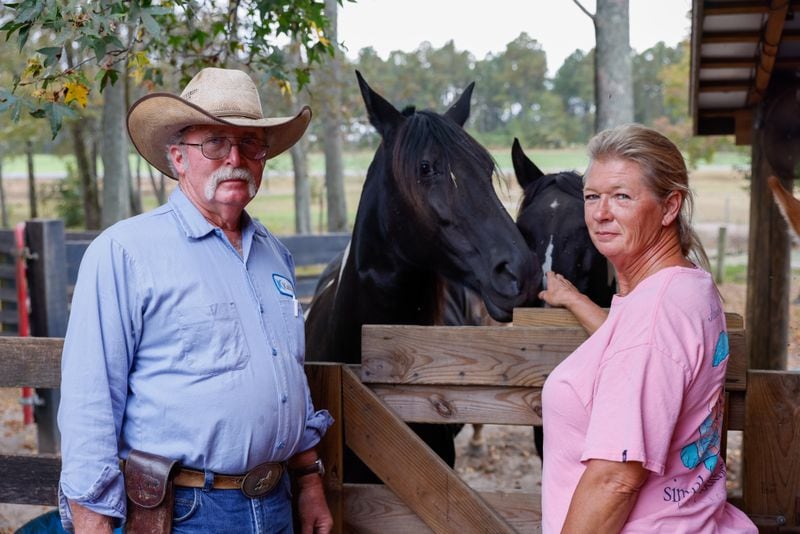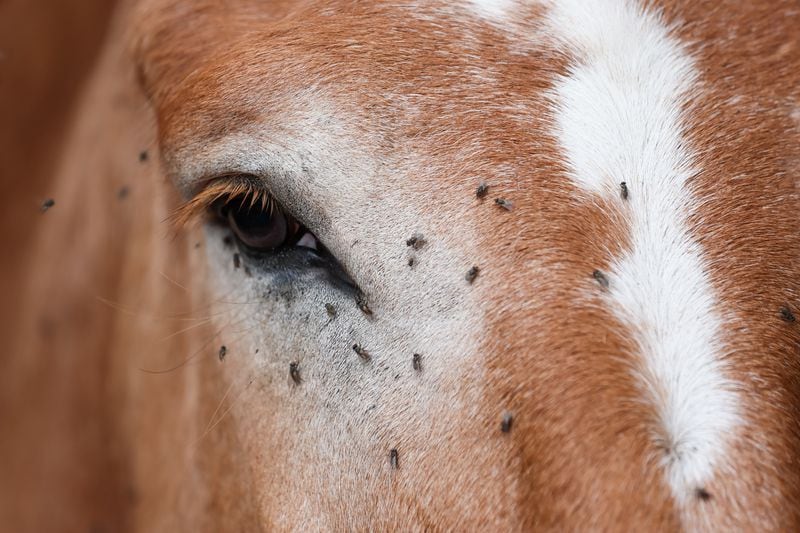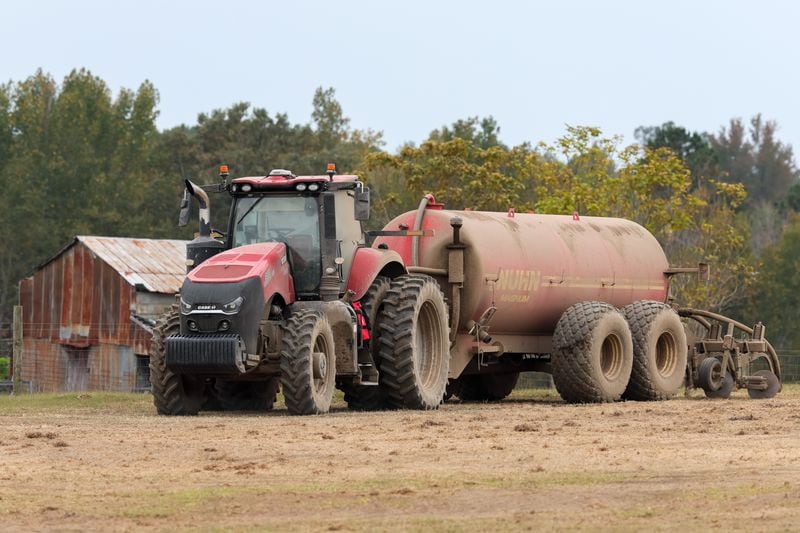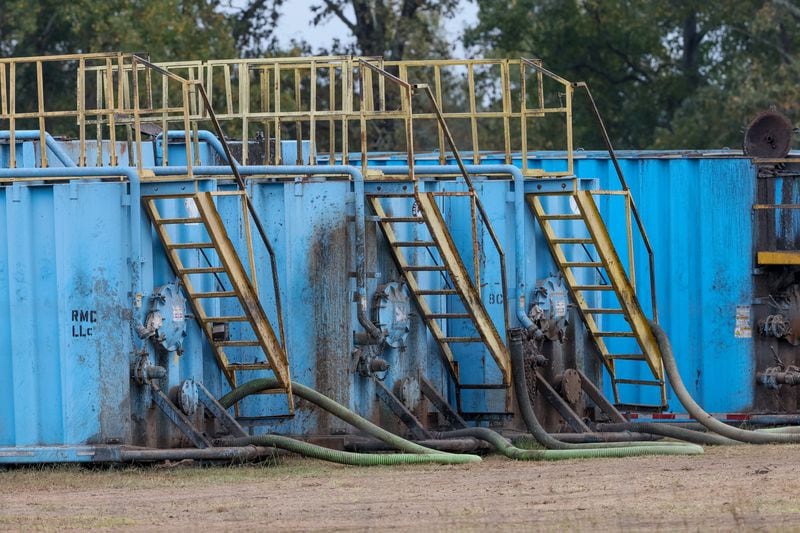MITCHELL — Roughly 50 miles southwest of Augusta, a tractor hitched to a large tank sat idle in a field off Edgehill-Mitchell Road in rural Glascock County. A half-dozen vultures pecked at the ground, attracted by the material it left in its wake.
The dark, sludge-like substance is considered a “soil amendment” — a term that encompasses both traditional soil additives including manure and mulch, as well as sewage and industrial waste.
Soil amendments have been used on Georgia farms for years and are regulated by the state Department of Agriculture. But their use ― and what’s allowed under Georgia law — has turned into an issue in this year’s contest for Agriculture Commissioner, with one of the two major candidates having played a leading role in weakening local regulatory authority.
Critics say soil amendments consisting of sewage and industrial waste provide little benefit while stinking up the air and diminishing neighbors’ quality of life. Others see the waste products as a form of recycling.
Glascock County farmer Ronnie Bobo said the company that provided the sludge told him it was biodegradable leftovers from a chicken processing plant. He hopes spraying it will lead to a productive hay harvest to feed his cattle. Bobo said he paid nothing for the waste and sees nothing wrong with using it.
“If it wasn’t environmentally friendly, I wouldn’t let them spray it,” Bobo said.
Credit: arvin.temkar@ajc.com
Credit: arvin.temkar@ajc.com
His neighbors, Libby and Jimmy Wilcher, have a different view.
The Wilchers say the sludge emits a pungent odor, and with it came clouds of flies that have irritated their horses for weeks.
“Listen ... we usually have minimal flies,” Libby Wilcher said. “When that started down there,” she said gesturing toward Bobo’s farm, “is when this started.”
Frustration over spotty regulation
Georgia law says animal and industrial byproducts can be used as soil amendments, as can “Class A” sewage sludge, if it has been treated to remove viruses and pathogens.
Companies seeking to register such products must also provide a breakdown of its mineral and metal contents to the Department of Agriculture. The materials also must be injected into the ground so that there is “no significant amount of soil amendment on the soil’s surface within one hour following injection.”
Critics say regulation of the industry is spotty.
“I understand wheels turn slowly in Atlanta when you get into Department of Agriculture type stuff,” said Greg Johnson, a Glascock County Realtor who lives near Bobo’s farm. “But I really wish local officials would do more.”
Sam Moore, the longtime chairman of the Wilkes County Commission, said he’s fielded calls about swarms of flies and sewage smells for at least 10 years. But recent state laws placed regulation in the hands of the state, and he says local officials have little power.
Credit: arvin.temkar@ajc.com
Credit: arvin.temkar@ajc.com
In June, a breached storage pond sent sludge into a tributary of Little River in Wilkes County, killing an estimated 1,700 fish. McAvoy Farms, also known as Mar-Leta Farms, was fined $85,000 last month by the Georgia Environmental Protection Division (EPD) and banned from accepting any more soil amendment.
But McAvoy Farms is one of the few businesses to face state penalties.
Department of Agriculture spokesman Amir Sports said the agency is weighing changes to its soil amendment rules. The proposed rule changes, published in July for public comment, would tighten regulations on the use of some waste-based products.
Agriculture Commissioner Gary Black, who is not seeking re-election, told Fox 5 Atlanta that he is aware of the soil amendment controversy, but he doesn’t have the power to ban them. Only state lawmakers could ban them, though Black’s department could enforce stricter rules.
A growing campaign issue
One of the main proponents of legislation that has eroded local authority on soil amendment regulations — state Sen. Tyler Harper — is the Republican nominee to succeed Black.
In 2021, Harper sponsored Senate Bill 260, which precludes county and city officials from requiring buffer zones around soil application sites greater than 100 feet. Critics say the law hampers local governments’ ability to regulate sludge.
Credit: arvin.temkar@ajc.com
Credit: arvin.temkar@ajc.com
This year, lawmakers passed the “Freedom to Farm” bill, which limits the ability of landowners who live near farms or slaughterhouses to sue over noises, smells or other impingements on their property. Harper also supported that legislation.
Harper’s Democratic challenger, Nakita Hemingway, says she only supports soil amendments that are “nutritive or regenerate the soil.”
“Voters need to know that Tyler Harper wrote SB260 which took away the power to regulate this controversial practice and the power of local county commissioners to prevent this from happening in their counties,” Hemingway said in a statement.
Harper, in a statement, touted his record of problem solving and said as ag commissioner he would commit himself to “working with stakeholders across the state to protect our consumers, hold bad actors accountable, and ensure the continued success of our state’s number one industry.”
Harper and Hemingway are scheduled to square off Tuesday in a televised debate.
Oglethorpe County Commission Chairman Jay Paul said he and commissioners from several counties met with Harper earlier this month. Paul and Moore, the Wilkes County chairman, said they want more local oversight.
Paul said Harper told them he would take action, if elected.
On Facebook, residents continue to document their complaints, sharing locations of new application sites. A resident of Jefferson County recently posted photos of fly paper sheets draped over trashcans to cull the pests. Hours later, the white paper was coated in a thick layer of bugs.
Credit: arvin.temkar@ajc.com
Credit: arvin.temkar@ajc.com
The Savannah Riverkeeper, a conservation non-profit, also tracks reports of application sites, with most along the I-20 corridor, east of Atlanta. Not all reported sites have been verified but those that have confirm what Savannah Riverkeeper Executive Director Tonya Bonitatibus calls a widespread issue.
”I think the reason it’s been allowed to go on for so long is that it wasn’t knocking on people’s back doors.” Bonitatibus said, “Now I think folks are paying attention.”
